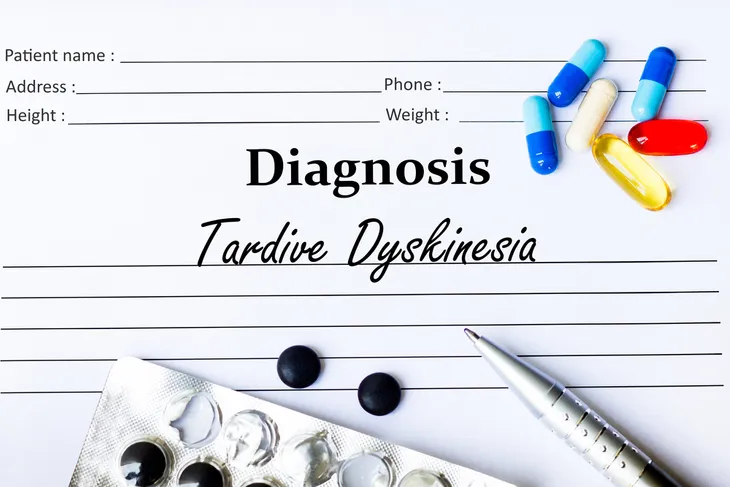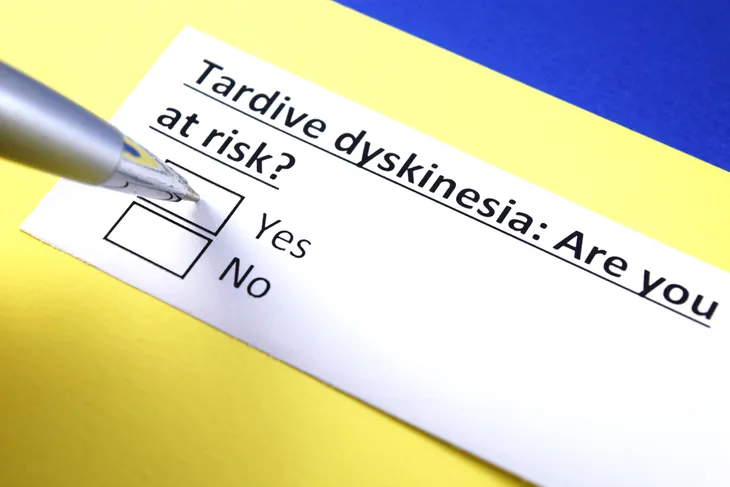Modern medicine has come a long way. Thanks to medicine we can treat many different ailments and diseases but in some cases, medications can have side effects. One side effect we’re looking into today is tardive dyskinesia (TD), “a neurological syndrome marked by random and involuntary muscle movements that usually occur in the face, tongue, lips, or jaw,” explains Everyday Health.
Tardive dyskinesia affects over 500,000 Americans which is why it’s important to have an understanding of what it is and what causes it. We’ll also look into the signs and symptoms you should watch out for, and how this condition can be treated. Here’s what you need to know about tardive dyskinesia.
What Is Tardive Dyskinesia
First, we want to explain tardive dyskinesia is a rare side effect of certain medications such as antipsychotics that treat mental illnesses. Although it’s worth mentioning, this side effect doesn’t usually happen instantly. Many individuals can take medication for years before developing this disorder.
Even though it is rare, it still impacts 500,000 Americans and the Cleveland Clinic says an “estimated 1 in 4 people who take antipsychotic (neuroleptic) medications for many years develop this problem.”
Tardive dyskinesia can cause an individual to develop uncontrolled or involuntary movements such as thrusting, twitching, and grimacing. Facial tics such as rapid blinking, lip-smacking, and tongue thrusting is also common.
What Causes Tardive Dyskinesia?
The cause of tardive dyskinesia is typically a side effect of antipsychotic or neuroleptic medications. These types of medications are usually prescribed to treat mental health disorders such as schizophrenia and bipolar disorder. That said, these medications can also be prescribed to help treat gastrointestinal conditions.
Medical professionals aren’t quite sure why some individuals develop tardive dyskinesia and others don’t but it might have something to do with the brain and dopamine receptor-blocking medications.
The Cleveland Clinic says nerve cells in your nervous system make dopamine (which is a neurotransmitter). “That means it sends messages to dopamine receptors (proteins in your brain and nerves). The two work together to send nerve signals that control body movements,” explains the source. So, the chemical changes in the brain may make some individuals more sensitive to dopamine and in turn, cause nerves to trigger involuntary movements.
Common Symptoms of Tardive Dyskinesia
The most telling sign of tardive dyskinesia is uncontrolled or involuntary movements. They can occur in the face, known as orofacial dyskinesia or oro-bucco-lingual dyskinesia, and typically affect the tongue, lips, or jaw. Common symptoms include:
- Frowning
- Chewing
- Smacking or puckering your lips
- Blinking your eyes fast
- Grunting
- Puffing your cheeks out
- Sticking your tongue out involuntarily
Dyskinesia can also affect other areas of the body, known as dyskinesia of the limbs. This typically affects your arms, fingers, legs, and toes. Some common symptoms include:
- Flapping your arms
- Wiggling your fingers
- Swaying from side to side
- Thrusting your pelvis
- Tapping your feet
When Do Symptoms Appear and How Long Do They Last?
The Cleveland Clinic explains “approximately 7 out of 10 people with tardive dyskinesia have mild symptoms.” However, the symptoms can get worse as time passes. But when do the symptoms actually start to appear?
The source says symptoms don’t appear right away, it usually takes years for symptoms to develop. In some cases, stress-induced situations can intensify the symptoms. The source also notes the symptoms usually go away during sleep.
The next question we need to address is how long do the symptoms last? The Clinic says symptoms usually go away or lessen when you lower the dose or stop taking the medication entirely. That said, some individuals still experience symptoms even after stopping the medication. It’s worth mentioning, never stop or change your dosage without the guidance of your doctor.
Risk Factors
Tardive dyskinesia can affect anyone regardless of age, gender, race, or ethnicity. That said, some factors can increase your risk. For example, older, black, or female individuals have a greater risk of developing the condition. Other factors that may also increase your risk include diabetes, substance use disorder, human immunodeficiency virus (HIV), or a traumatic brain injury (TBI).
Healthline also explains that individuals “who are taking an older version of these drugs — known as “first generation” antipsychotics — are more likely to develop TD than people using newer medications.” The longer you take the medications that cause this side effect, the greater risk you have for developing it too.
Conditions That are Linked to the Disorder
As we mentioned, tardive dyskinesia is typically caused by antipsychotic or neuroleptic medications. This means certain conditions are linked to the disorder and can increase your risk. Some of these mental health conditions include anxiety, depression, bipolar disorder, eating disorders, post-traumatic stress disorder (PTSD), attention deficit hyperactivity disorder (ADHD), obsessive-compulsive disorder (OCD), and schizophrenia.
Medications that treat gastrointestinal disorders like gastroparesis, gastroesophageal reflux disease (GERD), and nausea and vomiting are also linked to tardive dyskinesia. As are medications that treat neurological problems like dementia, Parkinson’s disease, and epilepsy.
When to See a Doctor
It’s important to note, that just because you or someone you love is taking these types of medications, doesn’t mean you/they will develop tardive dyskinesia. However, if you do develop any of the symptoms of tardive dyskinesia such as involuntary facial or body movements you should contact your doctor right away.
Make note of all your symptoms as well as the medications you are taking so you can provide your doctor with as much information as possible. Some important questions to ask your doctor are:
- What medication is causing my symptoms?
- Should I change or stop the medication?
- How can we treat my symptoms?
- What complications should I look out for?
How Is It Diagnosed?
Diagnosing tardive dyskinesia can be difficult, especially because it can take months or even years for the symptoms to appear. Healthline points out a diagnosis may be easier if you’re still using the medication and are experiencing symptoms but in some cases, symptoms can appear after you’ve stopped taking the medication which can make a proper diagnosis a bit more challenging.
To diagnose tardive dyskinesia your doctor will start with a physical exam. Healthline says they’ll also measure your movement abilities and use a scale known as the Abnormal Involuntary Movement Scale (AIMS). The scale will help your doctor measure three important elements:
- The severity of your movements
- If you’re aware of the movements
- If you’re in distress from the movements
Further, blood tests and brain scans may also be necessary to help rule out other disorders. After ruling out other conditions and assessing your movements your doctor may be able to make a diagnosis.
Treatment Options for Tardive Dyskinesia
If you develop symptoms of tardive dyskinesia your doctor will likely start by lowering your dosage. In some cases, they may choose to switch you to a new medication entirely. Typically one that is less likely to cause the condition in the first place.
When deciding the right treatment plan for you, your doctor will need to consider several factors. Some of these include your age, the type of medication you’re taking and how long you’ve been taking it for, as well as how severe the symptoms are.
Healthline says some natural remedies may help relieve some of your symptoms. These are ginkgo biloba extract and melatonin. That said, it’s always important to talk to your doctor before trying any natural remedy.
 novak.elcic / Shutterstock
novak.elcic / ShutterstockComplications
Although rare, some individuals develop severe symptoms (roughly 3-percent of individuals who suffer from tardive dyskinesia). Severe symptoms can affect your quality of life such as dental problems, breathing problems, and difficulty swallowing.
Another complication of this condition is it can make you self-conscious, especially if you develop irreversible facial changes such as drooping mouth or eyelids. Speech difficulties are another possible complication. The good news is, the Cleveland Clinic says these complications are rarely life-threatening. That said, you should still address them with your doctor if they happen to you.
Can It Be Prevented?
First, Healthline states the primary goal of treating tardive dyskinesia is to prevent it in the first place. To do this, your doctor will schedule regular evaluations. During your appointment, your doctor will examine your movement to find out if you’re developing the condition.
Unfortunately, tardive dyskinesia is unpredictable. Just because you’re taking the medication, doesn’t mean you will develop the condition. That said, if you have risk factors that make you more susceptible to the condition, you should talk to your doctor. If you’re at risk, your doctor may suggest another medication that doesn’t have tardive dyskinesia as a possible side effect.
What Is the Outlook?
The general outlook is good if you detect tardive dyskinesia early. Healthline says, “if you receive a diagnosis early, any symptoms you’re experiencing may resolve once you stop taking the medication, change medications, or reduce your dosage.” However, symptoms of tardive dyskinesia can be permanent. In some cases, the symptoms can get worse over time, even after stopping the medication that is causing the condition.
The best way to prevent it is to schedule regular checkups with your doctor if you’re taking antipsychotic medication. The source says yearly exams are recommended. If you’re worried about developing this condition don’t be afraid to ask your doctor about the possible side effects of your medication and what steps you can take to help prevent a tardive dyskinesia diagnosis.














